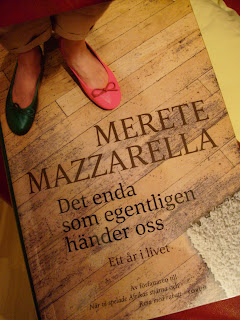Mazzarella is a retired professor of literature at Helsinki University (I know I have heard her lecture IRL, I just can´t for the life of me remember when and where), and it´s not the first book of this kind she has written. In the book, she chronicles how she travels and talks about another book she recently published about how to become a pensioner. She feels like a professional pensioner, she writes, and this book also deals a lot with aging and how to remain active and hold on to some kind of vitality when one´s body starts to protest about simple tasks like getting out of cars. She fears dementia and so she writes about memory, she fears becoming dependent on other people and so she writes about people who say they like to "work with people", about giving service to others. She writes about the poverty that will face many pensioners in the future.
Mazzarella keeps returning to one thing, only partly revealed, throughout the book, and that is her guilt about leaving her aging husband for a new love. In the process she has also lost her best friend, which clearly hurts just as much. She is trying hard not to justify her actions, nor will she allow herself any display of flagellation or humiliation. No doubt the little she gives away is enough to hurt some feelings of those involved.
She reflects and reads about what others have to say about the nature of the self. Do we have an authentic core or are we just the sum of our relationships and the roles we play? What is identity? What does a carer do when a demented vegetarian wants meat? When the personality disintegrates, should the carers care for the personality, defend it against the body´s urges? Are we our personalities or are we what our bodies make us? A complex weave of neurons, changing, growing or falling apart?
The idea with a book like this is that what happens to Mazzarella, what is important to her, is important to us all. I would say that´s right, and it´s very much a book that is present tense. It should be read now, when it´s fresh and current. Reading her is like listening to a friend who is very clever, not wise perhaps, but vigorous, still very much alive and kicking and growing. If you worry at all about the future, if you are at that age when the grey hairs are starting to bother you, or are making the transition into retirement, I heartily recommend Mazzarella. She is easy to read without being easy (if that makes sense), full of interesting suggestions on how to see things from a different perspective. She often tries several, and does not make her mind up about which one is the right one. And I can´t think of a better way to stay young than to think.
 |
| Am thinking. Don´t disturb. |











